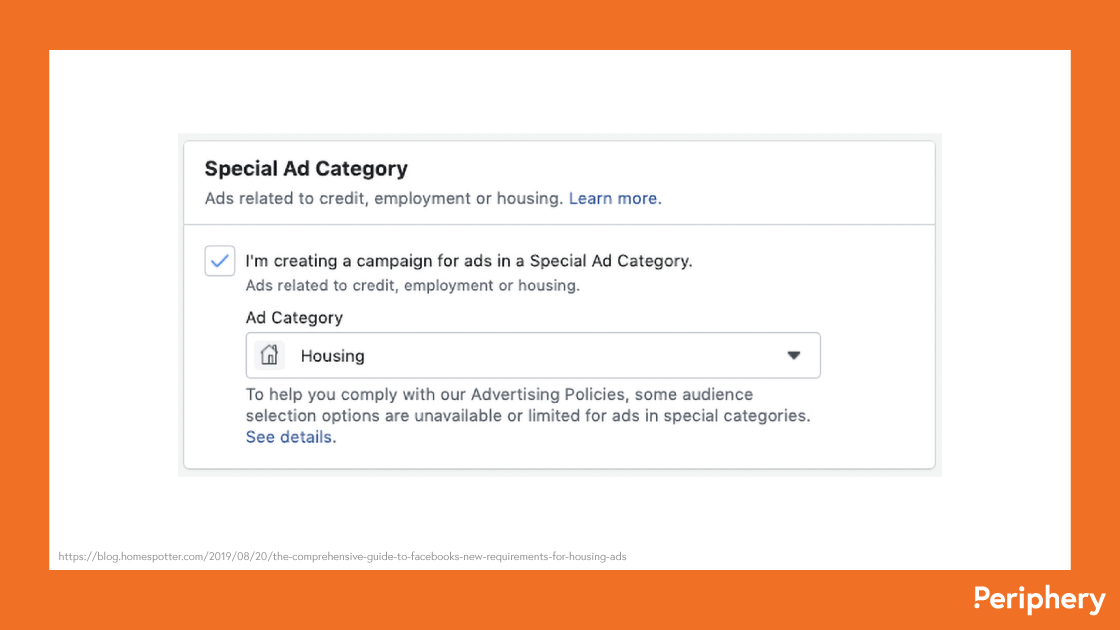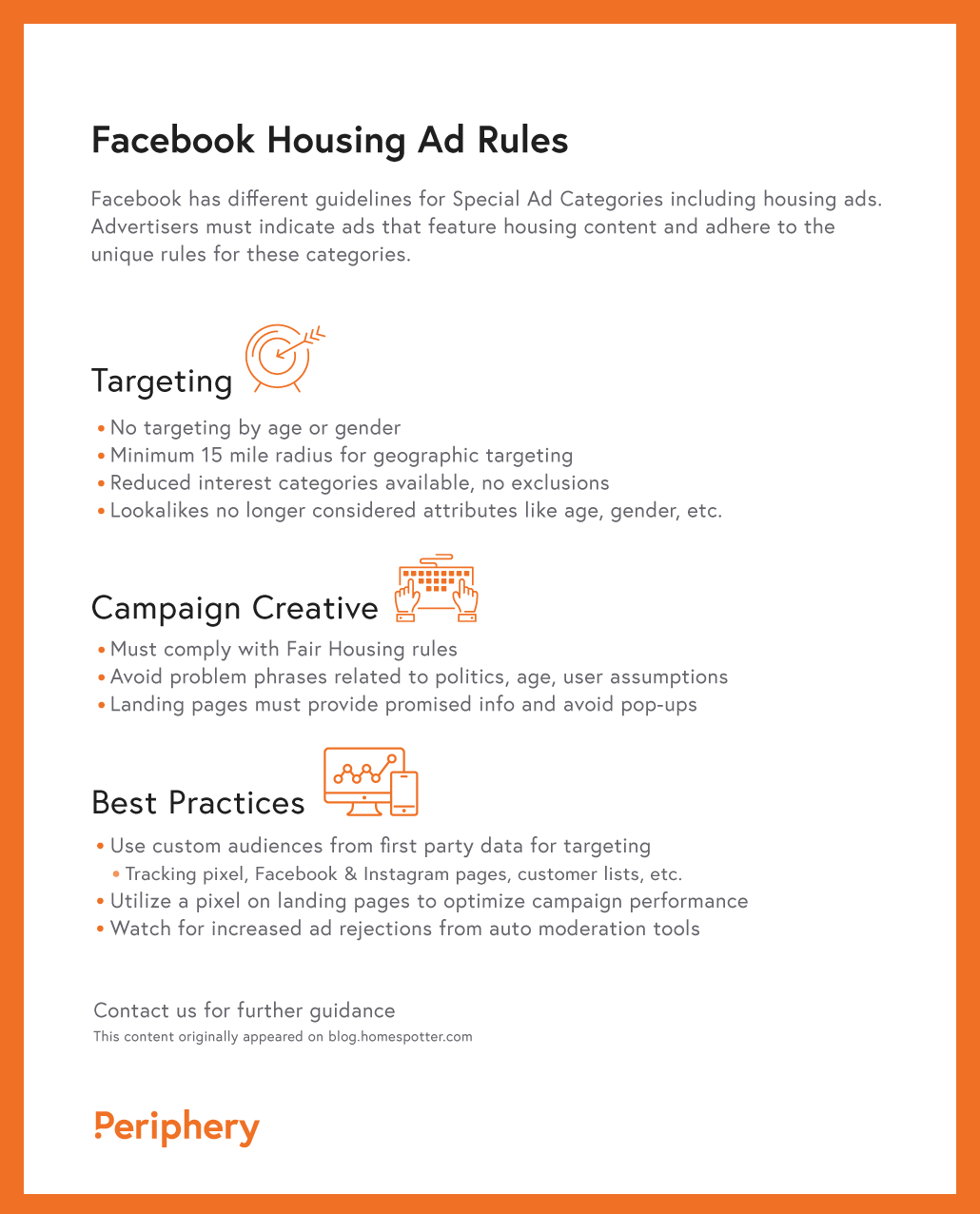Facebook has a long list of policies regarding what is and isn’t allowed in its advertisements. On December 3rd, 2020, Facebook has changed its policies for housing ads, affecting historical and future campaigns alike.
As a marketing agency focused on creating stellar Facebook Ads campaigns, staying on top of these changes to continue providing top-notch results for our real-estate clients is our first priority.
Advertisers must take great care to follow these policies to ensure ads aren’t rejected and account quality isn’t diminished. Continue reading to discover how Facebook Ads, specific to real-estate, have changed, and what you can do about it.
What is the Facebook policy update for housing ads?
Before the update, advertisers were allowed to serve their ads to highly customized audiences by targeting them through a large variety of parameters including age, gender, zip code, interests, and more. This ultimately increased the chances of conversion due to a narrower, more defined audience. For example:
- Male
- 26-29 year old
- Single
- Within 5 miles of postal code V6B 0P4
- Interested in designer fashion and owns the latest iPhone
- Interested in investments and apartments
- Recently started a new job in finance
- Frequent business traveler
Facebook is changing its policies regarding how advertisers are allowed to use its platform. Intended to prevent discrimination, some targeting options will be removed for some ad categories. These categories affect three areas in particular: Housing, employment, and credit, collectively referred to as HEC, and now known as Special Ad Categories.
The update was initially rolled out in the United States in 2019, and as of December 3rd, 2020, it will affect all HEC opportunity ads that target Canada.
Why is this happening?
Facebook has had discrimination policies for a long time. The Fair Housing Act of 1968 states advertising discrimination based on age, gender, and race is prohibited.
The update has come into place at this time in response to a number of lawsuits filed to Facebook by a few organizations including the National Fair Housing Alliance, Communications Workers of America, and more. They claimed Facebooks’ targeting was diminishing opportunities for essential services, causing an unfair advantage to some groups.
How will this impact ads moving forward?
When creating a new ad, you will be prompted to put it in a Special Ad Category. If your ads are related to housing, employment, or credit, you must declare a Special Ad Category. If you don’t, Facebook will flag your ads and they will be rejected. This may impact your ad account quality as Facebook will remember your initial lack of declaration, possibly having detrimental effects on future ad performance, and in the worst-case scenario, your account’s ability to serve ads.

The targeting options removed for Special Ad categories include race, gender, age, geographic targeting by postal or zip code, and interest targeting related to religion, gender, or ethnicity. Facebook has also removed the option to exclude audiences based on interests, as well as lookalike audiences.
Lookalikes are audiences Facebook finds who have similar characteristics to an audience of the advertiser’s choice, such as uploaded contact lists. Previously, these would consider all qualities of the selected audience, including demographics and interests.
After the update, Facebook has replaced lookalike audiences with Special Ad Audiences. These are similar to lookalikes but do not discriminate on the basis of age, gender, religion, etc and instead only do so by online behaviour.
Detailed targeting is still available, but many of the demographic, life event, and interest targeting options have been removed. Compared to the previous targeting example above, your ads will now be served to:
- All genders
- 18-65+ years old
- Any marital status
- Within 15 miles of postal code V6B 0P4
- Interested in apartments
- Any job title
Essentially, the targeting has changed from a niche user persona where advertisers are able to hone in on a very specific message or creative, to a very general group who are interested in apartments.
Facebook’s custom audiences will not be affected by this update. Custom audiences let you find existing audiences who already know your business. You can continue to target people who are on your email list, who have engaged with your Facebook posts, or who have visited your website as long as these audiences come from first party data. Companies should leverage this internal CRM data by segmenting and uploading contact lists in combination with other targeting to reach ideal audiences.
Although not new with the update, it is possible Facebook will double down on scrutinizing other aspects of the ads, like the ad copy, to ensure they comply with this update. Advertisers will need to take extra care when promoting alcohol, asking questions, and making assumptions about their audience to avoid their ads being flagged.
Homespotter, an advertising partner for Facebook’s Real Estate Division explains, “Even well-meaning phrases designed to bring out the value of a property like ‘bring your kids’ or ‘ideal for young singles’ are not allowed.”
Another consideration are landing pages. They must be relevant, load quickly, and not attempt to capture the visitor’s information through a pop-up.
Language targeting will also not be affected. As a bilingual marketing agency, we are relieved to hear this!
It is important to note although ads in Special Ad Categories are initially shown to broader audiences due to limited targeting, it will not necessarily have a long-term detrimental effect on performance. Upon launching any given ad campaign, Facebook’s algorithms will enter a learning phase and serve ads to audiences most likely to convert based on real-time conversion data.
Although these learning phases will take time, ultimately results should be similar to that of historical campaigns.
If you have any questions or would like to know how this update affects your ads in particular, please contact us.




